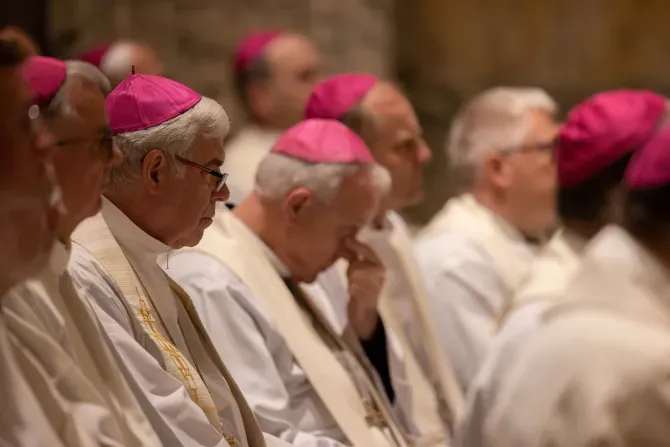Losing an achievement of Vatican II
Firstly, given the Synodal Way is not a synod, Ladaria said, it was not expected to produce a final document. Still, perhaps it should produce one — or something similar —” that can reflect a more linear approach and less reliance on assertions that are not fully substantiated.”
Secondly, the cardinal cast doubt on the Synodal Way’s assumed “connection between the structure of the Church and the phenomenon of abuse of minors.”
Ladaria warned the Germans of “reducing the mystery of the Church to a mere institution of power, or viewing the Church from the outset as a structurally abusive organization that must be brought under the control of superintendents as quickly as possible.”
Such an approach risks losing “one of the most important achievements of the Second Vatican Council,” Ladaria wrote: Namely, “the clear doctrine of the mission of the bishops and thus of the local Church.”
(Story continues below)
 Pope Francis meeting with the German bishops at the Vatican, Nov. 17, 2022. Vatican Media
Pope Francis meeting with the German bishops at the Vatican, Nov. 17, 2022. Vatican Media
On the question of ordaining women, Ladaria reminded the bishops, as he has stated previously: The teaching of the Catholic Church on the impossibility of ordaining women to the priesthood, now or in the future, is clear – and to sow confusion by suggesting otherwise is a serious matter.
Finally, the Prefect for the Congregation for the Doctrine of the Faith told the German bishops to recognize their role in the context of the Apostolic succession. “If it is true that the Magisterium is under the judgment of the Word, it is equally true that it is precisely through the exercise of the Magisterium of the bishops, and especially of the Bishop of Rome, that the Word comes alive and resounds vibrantly,” the cardinal wrote.
The terse warnings published this week were not the first intervention by the Vatican against the Synodal Way. In July, the Vatican issued a warning of a new schism arising from the process initiated by Cardinal Reinhard Marx.
German response: ‘Not a stop sign‘
Upon their return from Rome last week, some German bishops commented on the objections to their “reform project,” reported CNA Deutsch.
Bishop Franz-Josef Overbeck of Essen said the Vatican’s warnings were “not a stop sign for the important and necessary discussions we’re having,” such as the Synodal Way’s vote for women’s ordination.
 Bishop Franz-Josef Overbeck Photo: Nicole Cronauge / Diocese of Essen.
Bishop Franz-Josef Overbeck Photo: Nicole Cronauge / Diocese of Essen.
In short, the Synodal Way — Synodaler Weg in German, sometimes translated as the Synodal Path —is still expected to continue as planned by organizers, with the next (and so far final) synodal assembly to take place in spring of 2023.
In the meantime, German bishops are pushing ahead with making changes across the board to the Church in their dioceses, not just on the Synodal Way: This week, labor laws were amended so that employees of the Catholic Church can identify as LGBT, be “divorced” or not even Catholic.
While clerics and those in “pastoral care” are still expected to be Catholic, the Church — which employs about 800,000 people in Germany — is “enriched” by this “diversity in church institutions,” the German Bishops’ Conference said on Tuesday.
According to a report by CNA Deutsch, the bishops also said that “all employees can, regardless of their duties, their origin, their religion, their age, their disability, their sex, their sexual identity and their way of life,” now be representatives of “a Church that serves people.”
AC Wimmer is the News Editor for Europe and Asia at EWTN News. The multilingual Australian, raised in Bavaria and South Africa, served as editor-in-chief of several news media outlets. A graduate in Philosophy and Chinese Studies from the University of Melbourne, the veteran journalist is a former Honorary Research Fellow in Communications at his alma mater and served on the Board of Caritas in Munich.
 Facing the German bishops in Rome, Nov. 18, 2022: Cardinal Luis Ladaria Ferrer SJ, Prefect of the Dicastery of the Doctrine of the Faith, Cardinal Pietro Parolin, Secretary of State, and Cardinal Marc Ouellet PSS, Prefect of the Dicastery of Bishops (from left). Vatican Media
Facing the German bishops in Rome, Nov. 18, 2022: Cardinal Luis Ladaria Ferrer SJ, Prefect of the Dicastery of the Doctrine of the Faith, Cardinal Pietro Parolin, Secretary of State, and Cardinal Marc Ouellet PSS, Prefect of the Dicastery of Bishops (from left). Vatican Media




 Pope Francis meeting with the German bishops at the Vatican, Nov. 17, 2022. Vatican Media
Pope Francis meeting with the German bishops at the Vatican, Nov. 17, 2022. Vatican Media Bishop Franz-Josef Overbeck Photo: Nicole Cronauge / Diocese of Essen.
Bishop Franz-Josef Overbeck Photo: Nicole Cronauge / Diocese of Essen.


